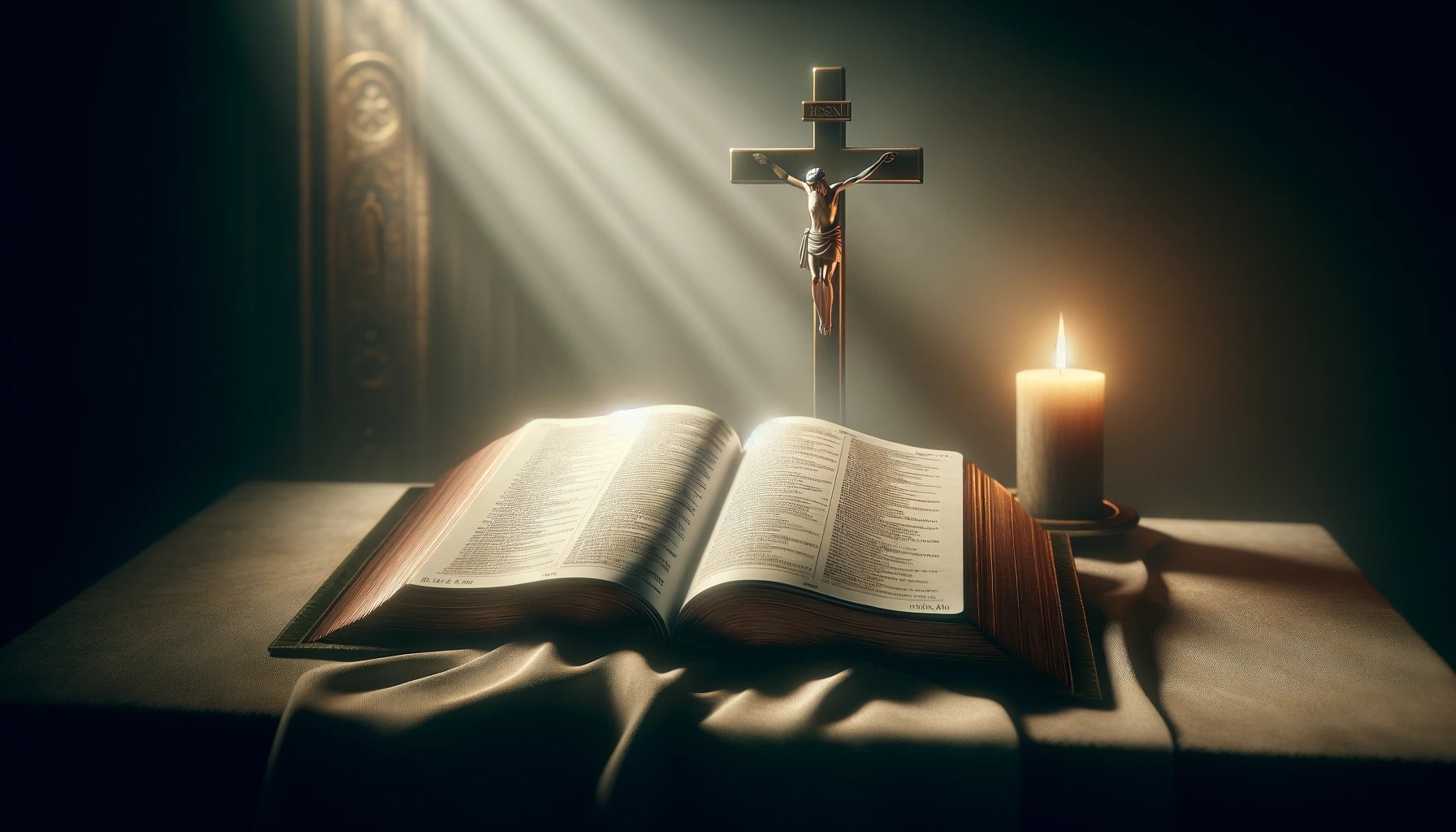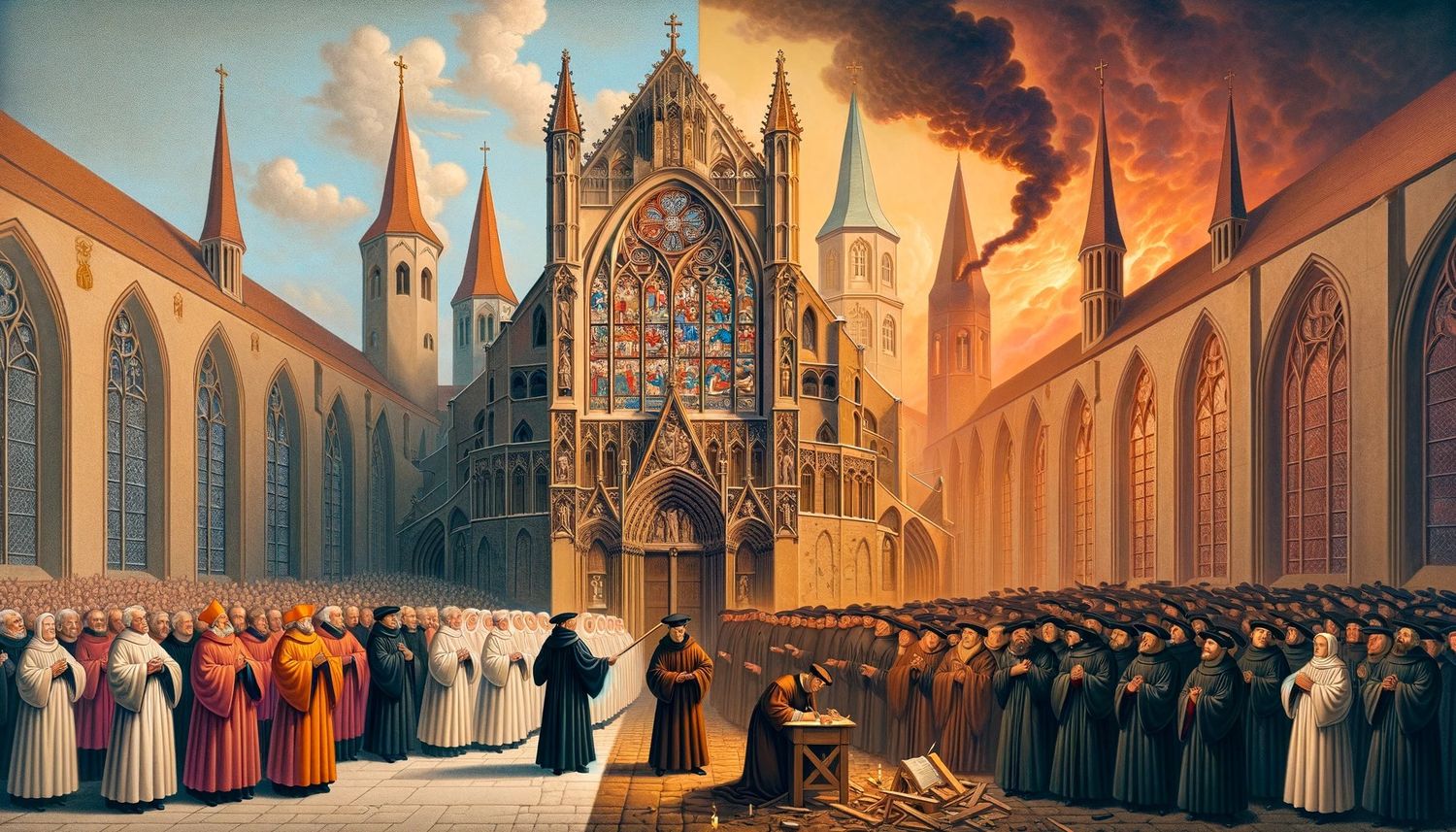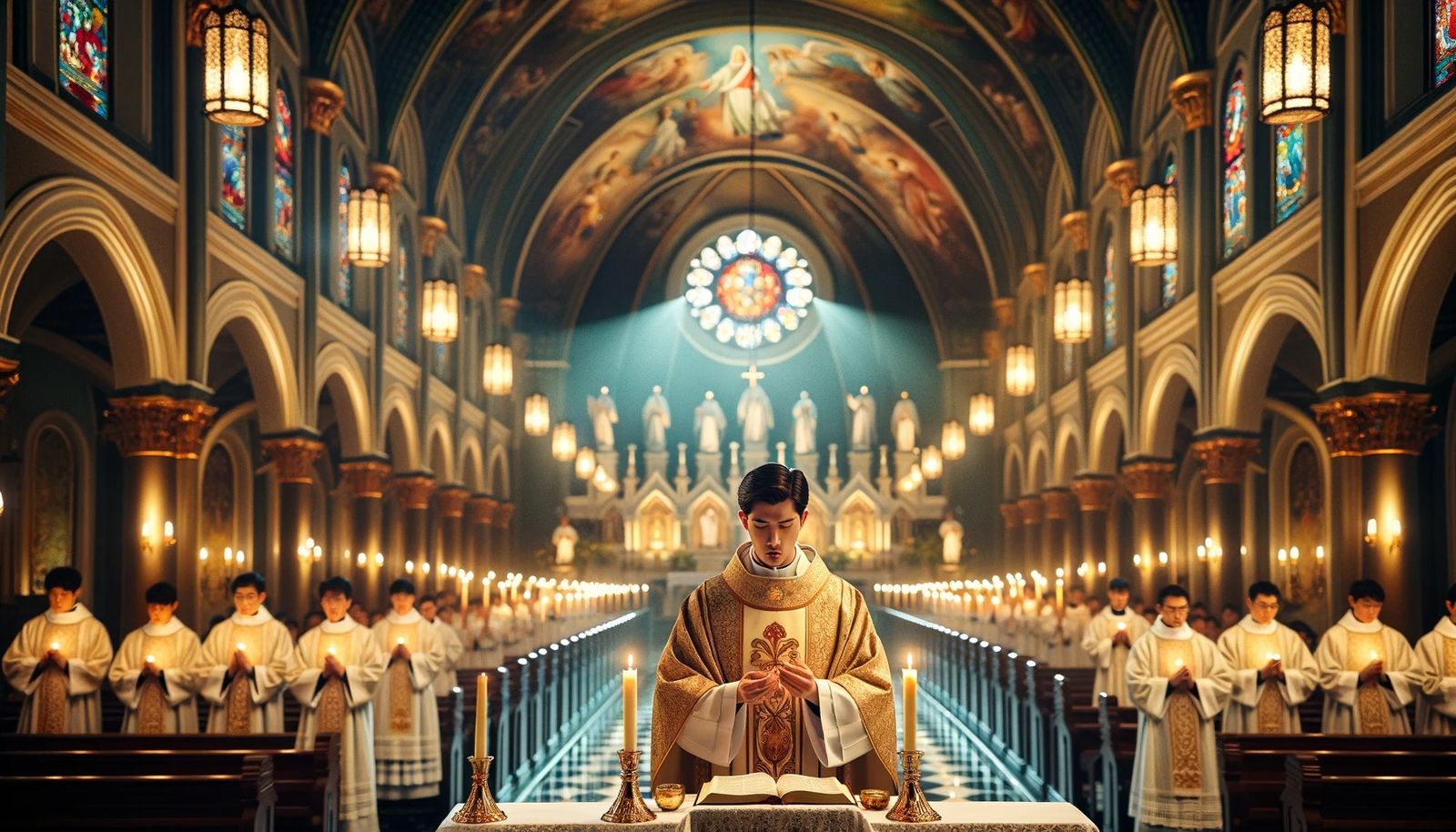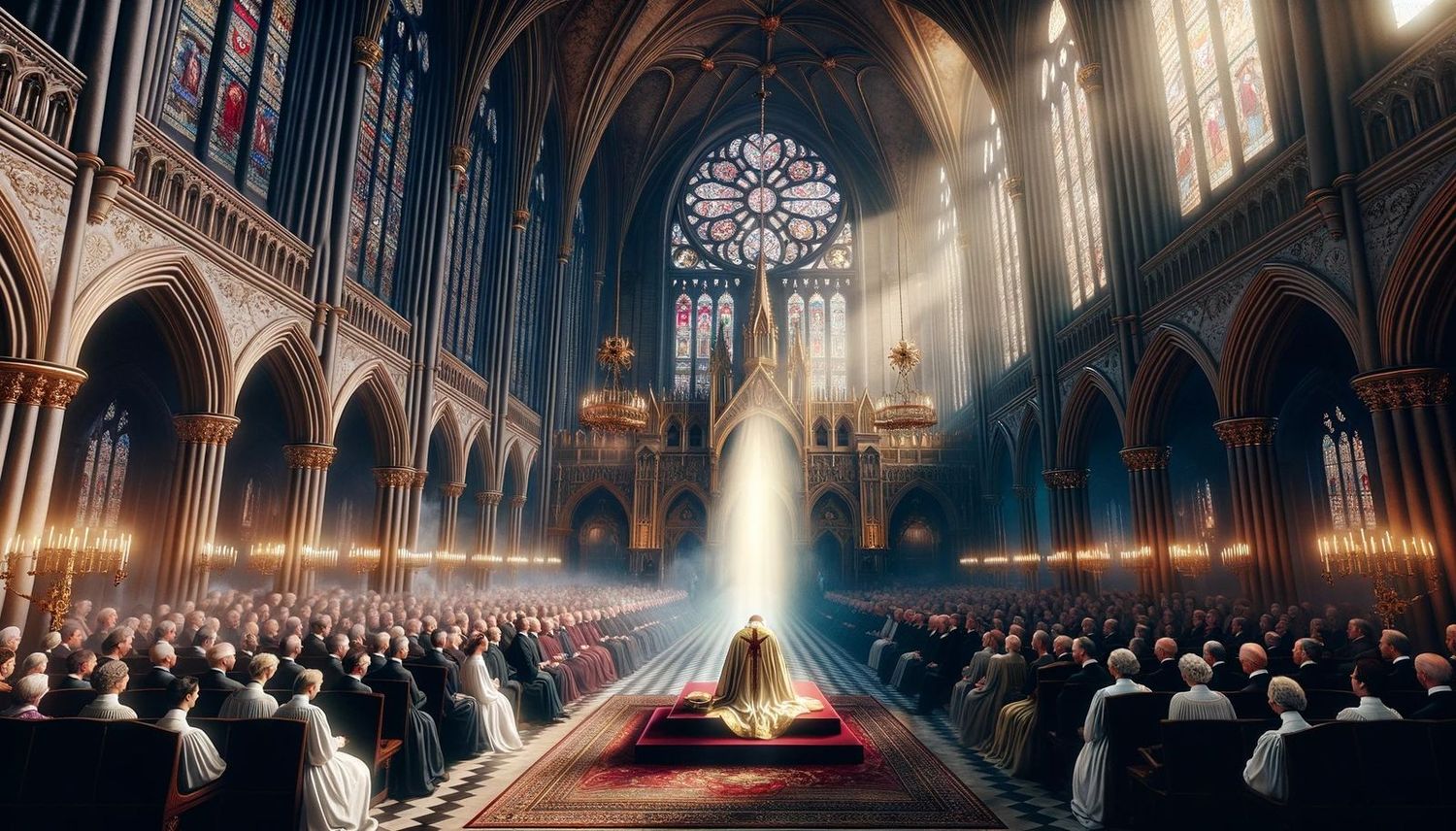Home>Theology and Spirituality>Why Catholicism Is Right


Theology and Spirituality
Why Catholicism Is Right
Published: February 17, 2024
Ericka Andersen, an editor at Christian.net, expertly merges digital strategy with content creation, focusing on faith and societal issues. Her communication skills enhance the platform's engaging narratives, fostering meaningful dialogue on belief's impact on society.
Discover the truth of Catholicism and its impact on theology and spirituality. Explore the reasons why Catholicism is the right choice for spiritual seekers.
(Many of the links in this article redirect to a specific reviewed product. Your purchase of these products through affiliate links helps to generate commission for Christian.net, at no extra cost. Learn more)
Table of Contents
Introduction
Catholicism, with its rich history, profound theological teachings, and enduring influence, stands as one of the most significant branches of Christianity. Rooted in the life and teachings of Jesus Christ, Catholicism has evolved over two millennia, shaping the spiritual, moral, and cultural landscapes of countless individuals and societies worldwide.
As we delve into the depths of Catholicism, we will explore its historical origins, theological underpinnings, moral and ethical precepts, the role of tradition and authority, and its commitment to social justice. Through this exploration, we aim to gain a comprehensive understanding of why Catholicism continues to resonate with millions of people and why it holds a prominent place in the tapestry of human spirituality.
Join us on this enlightening journey as we uncover the profound wisdom and enduring relevance of Catholicism in today's world.
Read more: Why Catholicism Or Orthodoxy
Historical Background of Catholicism
The historical roots of Catholicism can be traced back to the time of Jesus Christ and the early Christian communities. Following the crucifixion and resurrection of Jesus, his disciples, particularly Peter, emerged as key figures in spreading his teachings. The term "Catholic" itself, derived from the Greek word "katholikos," meaning "universal," reflects the early Church's aspiration to encompass all people and cultures.
The first centuries of Christianity were marked by persecution and martyrdom, yet the faith continued to spread across the Roman Empire. In 313 AD, the Edict of Milan, issued by Emperor Constantine, granted Christians the freedom to practice their faith, marking a pivotal moment in the history of Christianity.
The Council of Nicaea in 325 AD, convened by Constantine, played a crucial role in shaping the doctrinal foundations of the Christian faith. It addressed key theological controversies, including the nature of the Trinity, and laid the groundwork for the Nicene Creed, a statement of faith that remains central to Catholicism to this day.
The subsequent centuries witnessed the establishment of the papacy as a central authority within the Church, with the Bishop of Rome, known as the Pope, assuming a leadership role. The Great Schism of 1054 led to the division between the Western (Catholic) and Eastern (Orthodox) branches of Christianity, further shaping the distinct identity of Catholicism.
The medieval period saw the flourishing of monasticism, the rise of universities, and the construction of magnificent cathedrals, all of which contributed to the cultural and intellectual richness of Catholicism. The Renaissance and Reformation eras brought both challenges and renewal to the Church, leading to significant theological and ecclesiastical developments.
In more recent history, the Second Vatican Council (1962-1965) ushered in a period of reform and renewal within the Catholic Church, emphasizing greater engagement with the modern world and fostering ecumenical dialogue with other Christian traditions.
Today, Catholicism stands as a global faith, with over a billion adherents spanning diverse cultures and continents. Its historical journey, marked by triumphs and challenges, has shaped its distinctive identity and enduring impact on the world stage.
Theological Basis of Catholicism
At the core of Catholicism lies a robust theological framework that encompasses beliefs, doctrines, and practices rooted in the teachings of Jesus Christ and the early Christian Church. Central to Catholic theology is the belief in the Holy Trinity, which asserts the existence of one God in three persons: the Father, the Son (Jesus Christ), and the Holy Spirit. This foundational doctrine underscores the divine unity and diversity within the Godhead, serving as a cornerstone of Catholic faith.
The sacramental nature of Catholic theology is another defining aspect, emphasizing the tangible and transformative encounters with God through rituals such as the Eucharist, Baptism, Confirmation, Reconciliation, Anointing of the Sick, Holy Orders, and Matrimony. These sacraments are regarded as visible signs of God's grace, conveying spiritual nourishment and empowerment to the faithful.
The authority of Scripture and Tradition holds significant weight in Catholic theological thought. While the Bible is revered as the inspired Word of God, the Church also upholds the importance of apostolic tradition, which encompasses the teachings passed down from the apostles and the early Christian community. This dual emphasis on Scripture and Tradition forms the basis for interpreting and transmitting the faith across generations.
The doctrine of salvation in Catholic theology centers on the redemptive work of Jesus Christ, who, through his life, death, and resurrection, offers the path to reconciliation with God. The concept of grace, understood as God's unmerited favor and assistance, plays a pivotal role in the process of salvation, highlighting the cooperative relationship between divine grace and human response.
The veneration of Mary, the mother of Jesus, and the communion of saints are integral components of Catholic theological devotion. Mary is honored as the Theotokos, the Mother of God, and holds a revered position as a model of faith and intercessor for believers. The communion of saints encompasses the spiritual bond among all the faithful, both living and deceased, affirming the interconnectedness of the Church across time and space.
The theological richness of Catholicism extends to moral and ethical teachings, social doctrines, and eschatological perspectives, all of which contribute to a comprehensive and multifaceted understanding of the faith. This theological depth continues to inspire and guide Catholics in their spiritual journey and engagement with the world around them.
Moral and Ethical Teachings of Catholicism
Central to Catholicism are its moral and ethical teachings, which provide a comprehensive framework for guiding individual conduct and shaping societal values. At the heart of these teachings is the belief in the inherent dignity of every human person, rooted in the understanding that each individual is created in the image and likeness of God. This foundational principle forms the basis for a wide range of moral imperatives that encompass personal virtues, social responsibilities, and ethical decision-making.
The Catholic moral tradition draws from diverse sources, including Sacred Scripture, the wisdom of the Church Fathers, philosophical insights, and ongoing theological reflection. At its core is the ethical imperative to love God and love one's neighbor as oneself, encapsulating the dual commandment articulated by Jesus Christ. This call to love serves as the guiding principle for moral discernment and action, shaping the attitudes and behaviors of Catholics in their daily lives.
The Ten Commandments, given to Moses in the Old Testament, provide a foundational ethical framework within Catholicism, addressing fundamental obligations toward God and fellow human beings. These commandments encompass reverence for God, respect for life, fidelity in relationships, honesty, and integrity, offering timeless guidance for moral living.
Catholic moral teaching also encompasses a wide range of ethical issues, including social justice, human rights, bioethics, environmental stewardship, and the promotion of the common good. The Church's social doctrine, rooted in principles of solidarity, subsidiarity, and the preferential option for the poor, underscores its commitment to addressing systemic injustices and promoting the well-being of all members of society.
The ethical teachings of Catholicism extend to areas such as the sanctity of life, the dignity of marriage and family, the pursuit of peace and reconciliation, and the responsible stewardship of resources. These teachings provide a moral compass for navigating complex ethical dilemmas and engaging with contemporary societal challenges.
In summary, the moral and ethical teachings of Catholicism offer a robust and nuanced framework for ethical living, emphasizing the intrinsic value of every human person, the pursuit of justice and compassion, and the cultivation of virtuous character. These teachings continue to inspire individuals and communities to uphold ethical standards and work toward the flourishing of all members of the human family.
The Role of Tradition and Authority in Catholicism
In Catholicism, tradition and authority play pivotal roles in shaping the beliefs, practices, and governance of the Church. The concept of tradition, encompassing both divine revelation and the living transmission of the faith through time, holds a central place in Catholic theology. The Church regards tradition as the vehicle through which the Holy Spirit guides and sustains the ongoing life of the Christian community, ensuring the continuity and fidelity of the faith across generations.
Tradition in Catholicism encompasses various elements, including liturgical practices, doctrinal formulations, devotional customs, and the wisdom of the Church Fathers and saints. These traditions serve as a rich tapestry that connects contemporary believers with the early Christian community and the apostolic witness, fostering a sense of continuity and unity within the Church. The celebration of the sacraments, the veneration of saints, the observance of liturgical seasons, and the recitation of ancient prayers all reflect the living tradition that animates Catholic spirituality.
Authority within the Catholic Church is structured around the concept of the Magisterium, which comprises the Pope and the college of bishops in communion with him. This hierarchical structure, rooted in apostolic succession, is regarded as the custodian of the deposit of faith, entrusted with the task of preserving and interpreting the teachings of Jesus Christ and the apostles. The Pope, as the successor of St. Peter, is recognized as the supreme authority in matters of faith and morals, while the bishops, as successors of the apostles, share in the responsibility of shepherding the faithful and safeguarding the Church's teachings.
The interplay between tradition and authority in Catholicism is characterized by a dynamic relationship that upholds the integrity of the faith while allowing for organic development and adaptation to changing circumstances. The Magisterium, guided by the Holy Spirit, exercises its authority in interpreting and applying the deposit of faith, ensuring doctrinal coherence and pastoral relevance. This authoritative guidance, in harmony with tradition, provides a stable foundation for the spiritual life of Catholics and the governance of the Church.
In essence, tradition and authority in Catholicism form an inseparable bond, sustaining the continuity of the faith and providing a framework for doctrinal clarity and pastoral care. This dynamic interplay between tradition and authority underscores the living nature of the Catholic faith, rooted in the timeless truths of revelation and responsive to the evolving needs of the faithful and the world.
Read more: Why Is Catholicism A Cult
Catholicism and Social Justice
Catholicism has long been synonymous with a steadfast commitment to social justice, rooted in the teachings of Jesus Christ and the Church's rich moral and ethical tradition. At the heart of Catholic social teaching lies a profound concern for the dignity of every human person, the pursuit of the common good, and the alleviation of suffering and injustice in society.
Central to Catholic social doctrine is the principle of solidarity, which emphasizes the interconnectedness of all people and the imperative to stand in unity with those who are marginalized or oppressed. This solidarity extends beyond geographical, cultural, and ideological boundaries, calling for a global awareness of and response to the needs of the human family. The Church's advocacy for solidarity underscores its unwavering commitment to fostering a more just and compassionate world.
The preferential option for the poor and vulnerable represents another cornerstone of Catholic social teaching. This principle underscores the moral obligation to prioritize the needs of the marginalized and disadvantaged, ensuring that their voices are heard, their rights are upheld, and their dignity is respected. Through this preferential option, Catholicism champions the cause of those on the margins of society, advocating for systemic change and empowerment.
The Catholic Church's engagement in social justice extends to a wide range of issues, including poverty alleviation, human rights advocacy, environmental stewardship, immigration reform, and the promotion of peace and reconciliation. Through its global network of charitable organizations, educational institutions, healthcare facilities, and social service agencies, the Church actively addresses the multifaceted challenges facing individuals and communities worldwide.
The Church's social doctrine also emphasizes the importance of subsidiarity, which calls for decision-making and action to occur at the most local and immediate level possible, while also recognizing the essential role of larger institutions in supporting and empowering local initiatives. This principle underscores the value of community participation and empowerment in addressing social issues, fostering a sense of ownership and responsibility among individuals and groups.
In summary, Catholicism's commitment to social justice reflects its unwavering dedication to upholding human dignity, promoting solidarity, and advocating for the rights and well-being of all members of society. Through its moral and ethical teachings, institutional outreach, and advocacy efforts, the Catholic Church continues to be a powerful force for positive change and social transformation in the world.
Conclusion: The Case for Catholicism
In examining the multifaceted dimensions of Catholicism, it becomes evident that the faith's enduring relevance and profound impact stem from its rich historical legacy, robust theological framework, ethical teachings, and unwavering commitment to social justice. Catholicism's historical background, dating back to the time of Jesus Christ and the early Christian communities, reflects a journey marked by resilience, cultural influence, and global expansion. The theological basis of Catholicism, anchored in the belief in the Holy Trinity, sacramental life, and the interplay of Scripture and Tradition, provides a comprehensive framework for spiritual growth and understanding.
The moral and ethical teachings of Catholicism, rooted in the inherent dignity of every human person and the call to love and serve others, offer timeless guidance for navigating the complexities of human existence. Furthermore, the role of tradition and authority within Catholicism underscores the dynamic interplay between preserving the richness of the faith and responding to the evolving needs of the faithful and the world. This balance ensures doctrinal coherence and pastoral relevance, fostering a sense of continuity and unity within the Church.
Catholicism's unwavering commitment to social justice, exemplified through principles of solidarity, the preferential option for the poor, and subsidiarity, positions the Church as a powerful advocate for the marginalized and a catalyst for positive change in society. Through its global outreach and advocacy efforts, the Catholic Church continues to address pressing issues such as poverty, human rights, environmental stewardship, and peace-building, embodying the principles of compassion, justice, and solidarity.
In essence, the case for Catholicism rests on its ability to offer a holistic and transformative vision of human flourishing, rooted in the love of God and neighbor, the pursuit of truth and virtue, and the promotion of the common good. As Catholicism continues to engage with the challenges and opportunities of the modern world, its enduring legacy and profound contributions to spirituality, ethics, and social transformation affirm its significance as a vibrant and influential force in the tapestry of human experience.














